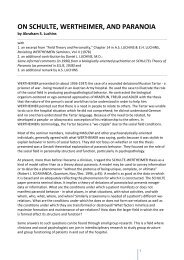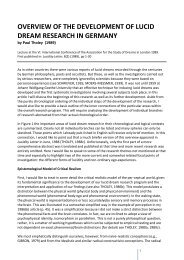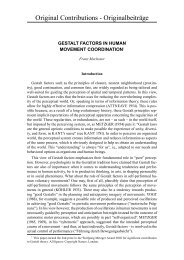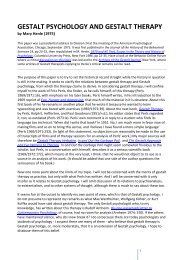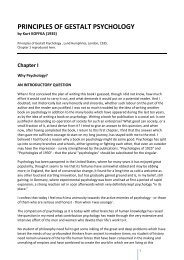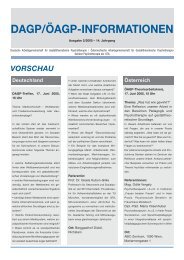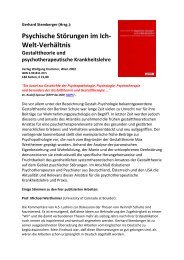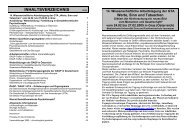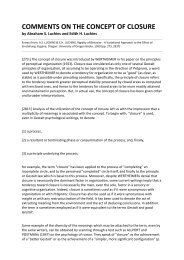pdf-Download - Society for Gestalt Theory and its Applications (GTA)
pdf-Download - Society for Gestalt Theory and its Applications (GTA)
pdf-Download - Society for Gestalt Theory and its Applications (GTA)
You also want an ePaper? Increase the reach of your titles
YUMPU automatically turns print PDFs into web optimized ePapers that Google loves.
synagogues were destroyed or severely damaged (not the 191, as previously claimed on the basis<br />
of Nazi sources!), 7,000 Jewish-owned shops were v<strong>and</strong>alized, 30,000 Jewish men were arrested<br />
<strong>and</strong> taken to unknown destinations - which we now know to have been the concentration camps<br />
of Buchenwald, Dachau, <strong>and</strong> Sachsenhausen - <strong>and</strong> nearly 100 Jews were beaten <strong>and</strong> killed <strong>and</strong><br />
thous<strong>and</strong>s underwent torments in a wild orgy of destruction" (p. 9).[15] After Kristallnacht<br />
GRELLING did not return to Germany.<br />
NEURATH repeatedly encouraged GRELLING to emigrate. Their letters discussed the possibility of<br />
GRELLING coming to France to serve as a correspondent <strong>for</strong> the institute that NEURATH hoped to<br />
establish in the Netherl<strong>and</strong>s, where he had come after fleeing from Austria to escape from the<br />
Nazis.[12] One plan was <strong>for</strong> GRELLING to compile bibliographic <strong>and</strong> historical material centering on<br />
the history of mathematical logic in France, particularly the influence of Louis COUTURAT.[15a]<br />
(Any plans NEURATH <strong>and</strong> GRELLING had <strong>for</strong> joint work were shattered when the Nazis invaded<br />
both the Netherl<strong>and</strong>s <strong>and</strong> Belgium on the same day, 10 May 1940; GRELLING was arrested <strong>and</strong><br />
NEURATH had to escape again, this time to Engl<strong>and</strong>.)<br />
NEURATH had advised GRELLING to attend the Fifth International Unity of Science Congress at<br />
Harvard University in 1939. However, by June 1939 GRELLING had not yet received his tourist visa.<br />
He began to have doubts about whether the expensive journey was worthwhile. NEURATH<br />
admitted that whether or not GRELLING would be noticed at the Harvard meeting was a risk, but if<br />
one didn't take the risk, one could not win. "I do not think that you will attract attention with your<br />
lecture at Harvard [but] you will talk to many people personally. And the personal is the point <strong>for</strong><br />
Anglo-Saxons" (p. 16)[5]. He also encouraged GRELLING to write to RUSSELL, reminding him of<br />
how devoted he was to his work, <strong>and</strong> inquiring if there was any way he could help him. [This<br />
inquiry might refer to either RUSSELL helping GRELLING or GRELLING being of service to RUSSELL,<br />
or both.] All this advice did not help <strong>and</strong> GRELLING ab<strong>and</strong>oned his plans to attend the meeting at<br />
Harvard University. Recognizing that his decision might be wrong, he wrote to NEURATH, "It's a<br />
pity...that one is restricted to such a low rate of rationality in decisions most important <strong>for</strong> the<br />
personal fate" (Ibid.). The decision turned out to be of vital importance. Of course it is not known<br />
if he would have been permitted to attend, or if he would have been denied a visa, as in 1937,<br />
because he could not provide evidence of being an "Aryan."<br />
OPPENHEIM <strong>and</strong> HEMPEL<br />
Paul OPPENHEIM (1885-1977) studied in his native city Frankfurt as well as in Giessen where he<br />
earned a doctorate in chemistry. In 1912 OPPENHEIM married Gabrielle ERRERA who was born in<br />
Brussels, Belgium. He joined his father's wholesale jewelry firm, but left in about 1924 to become<br />
the director of a chemical firm, which became part of I.G. FARBEN.<br />
OPPENHEIM was active in the intellectual <strong>and</strong> artistic life of Frankfurt be<strong>for</strong>e fleeing from<br />
Germany in 1933.[16] The OPPENHEIMS settled in Brussels <strong>for</strong> six years be<strong>for</strong>e coming to the<br />
United States in 1939.<br />
These details about OPPENHEIM were obtained from an obituary article in the New York<br />
Times.[16] They were supplemented by in<strong>for</strong>mation obtained from his son, Felix OPPENHEIM, who<br />
also referred us to a report on his father that concentrated on his scholarly activities.[16a] Its<br />
analysis of his writings provided the basis <strong>for</strong> our analysis.[16b] Its listing of publications<br />
contributed to the bibliography we compiled. OPPENHEIM preferred working in the philosophy of<br />
science outside of academe with intellectual collaborators, among them Carl G. HEMPEL <strong>and</strong><br />
11



